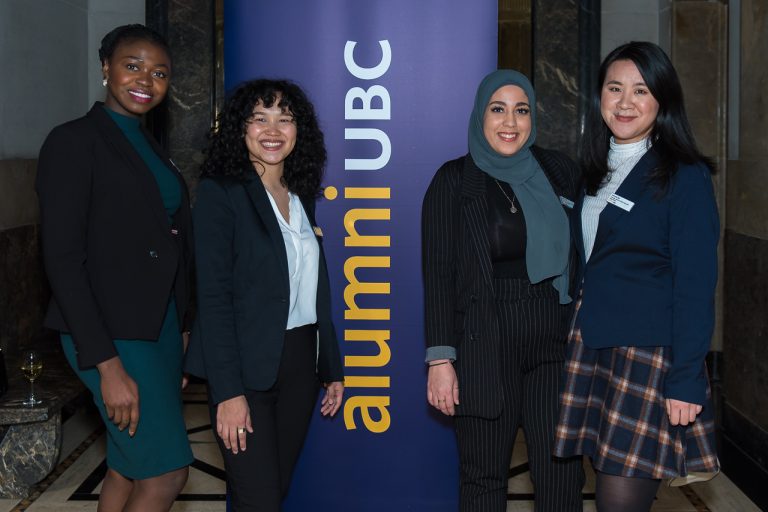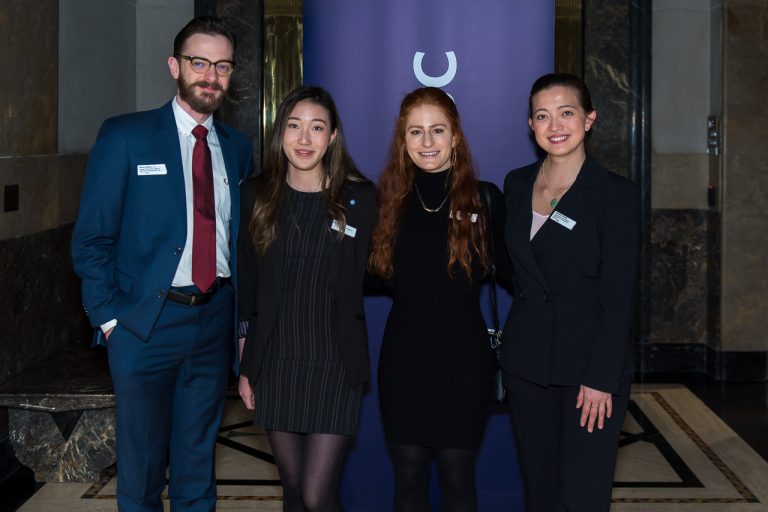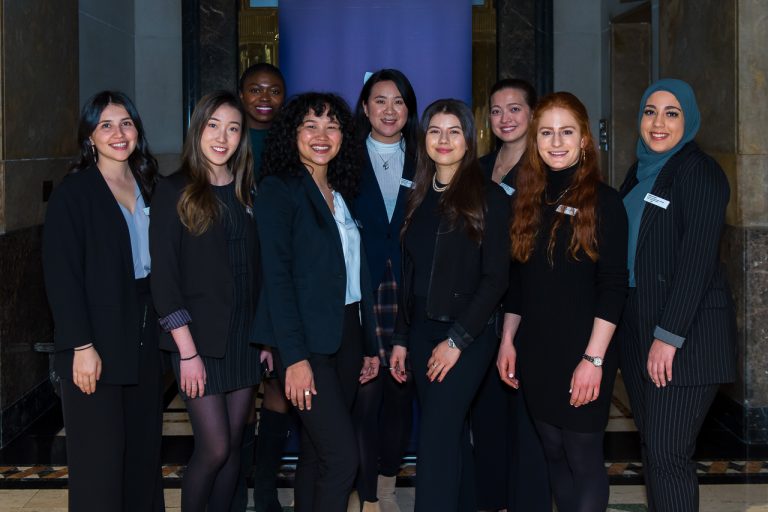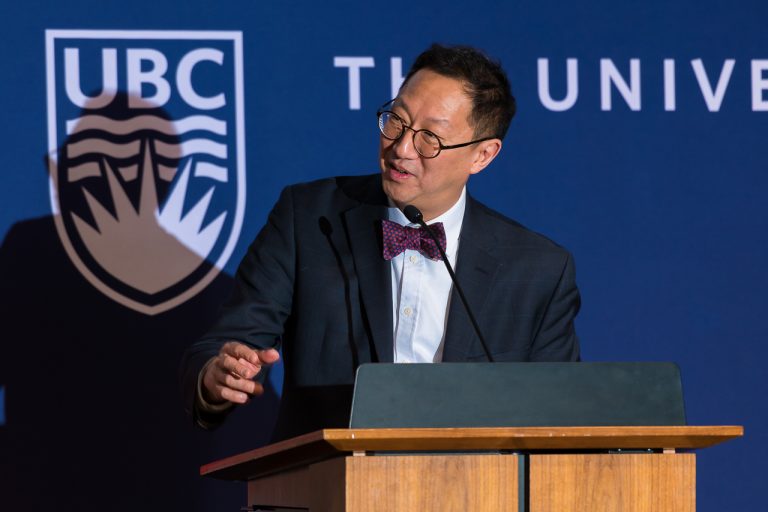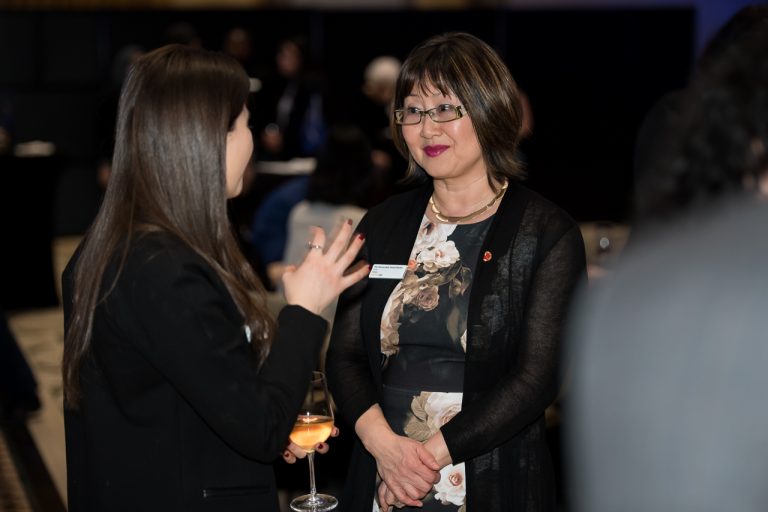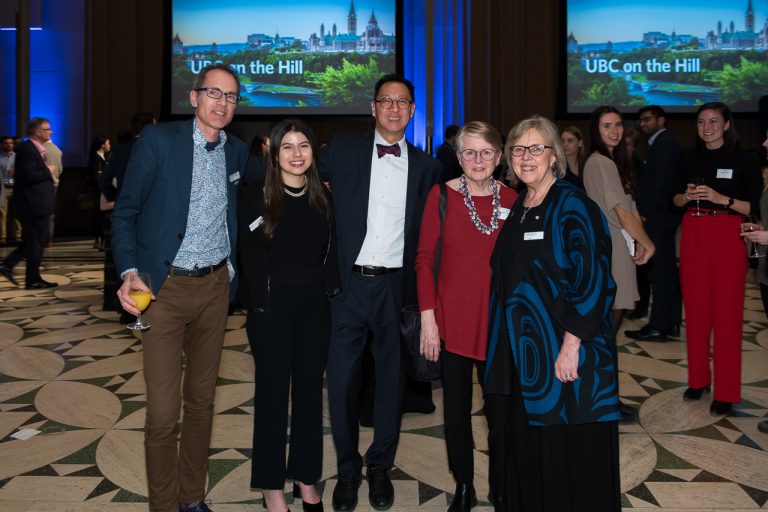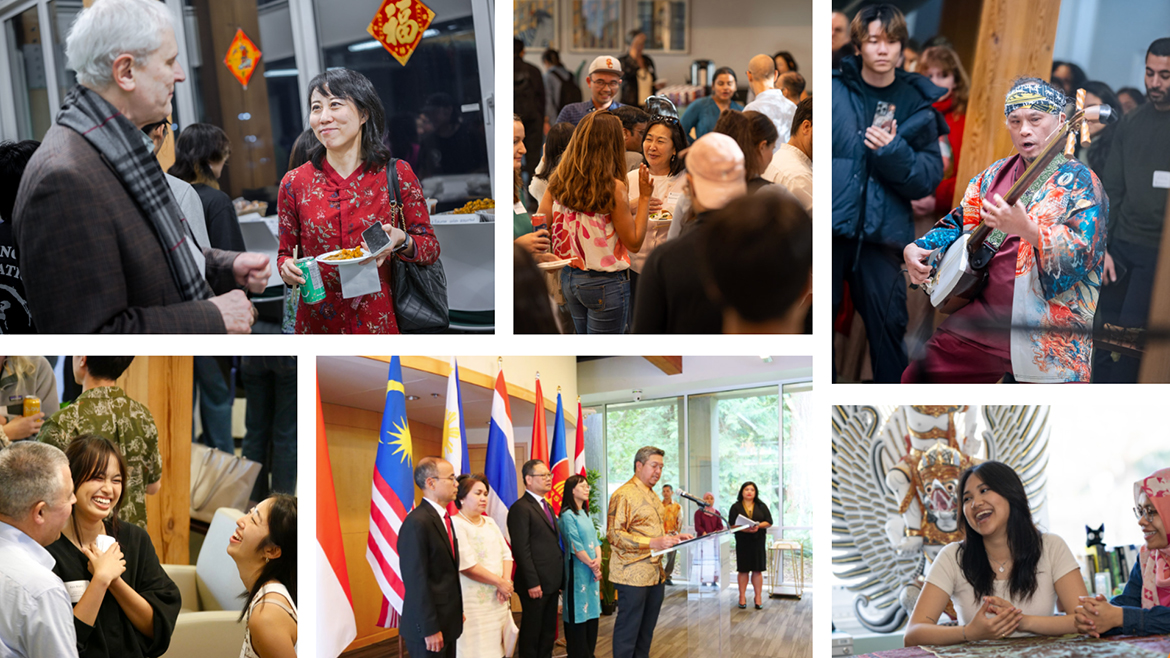Ten UBC undergraduate and graduate students participated in the second year of UBC’s Women in House (WiH) program, hosted by UBC’s School of Public Policy and Global Affairs (SPPGA) with support by the Centre for the Study of Democratic Institutions, on March 9-10, 2020 in Ottawa.
According to the students’ own accounts, the UBC WiH program succeeded in providing them an inside look into the working lives of female politicians in Canada, as well as leaving them informed and inspired to pursue their passions.
Each student shadowed a female Member of Parliament (MP) or Senator for a day, attending meetings, learning from high level discussions, and receiving meaningful advice regarding the challenges of being a woman in politics.
In addition, the student group was guided around the Supreme Court and the Senate, watched the Question Period in the House of Commons, listened to a panel of foreign Heads of Mission share about gender equality in politics, and interacted with UBC President Santa Ono, Senators, Members of Parliament, and UBC alumni working at Global Affairs Canada at an evening networking reception.
Participating in the UBC Women in House program was an enriching experience that exposed me to valuable mentors, networking opportunities, and a deeper look into the Canadian parliamentary system.
– Nabila Farid, Master of Public Policy and Global Affairs
Enjoy the reflections from the student participants below:
“Earlier this month, I had the privilege of being part of a group of students selected to participate in UBC’s Women in House program. Women in House provided a number of opportunities for us to interact with women leaders: we attended a panel discussion regarding microaggressions against women in the workplace, heard Senator Martin’s experiences when she first arrived at Parliament Hill, had lunch with women who had experienced the nomination and campaigning process, and finally flew to Ottawa to watch women leaders of Canada in action. As a policy student, it was a particularly inspirational experience being at the heart of where Canada’s national decisions are made and to be surrounded by people who are passionate about doing their best for our country.
Through the program I was able to meet many incredible women and hear about their experiences and the challenges they face. I was surprised to learn how the journeys of these women differed: some were mothers, some were counsellors, some were teachers. When I first started my studies, I was concerned that I had made the wrong decision because of my lack of a background in social sciences; however, speaking to women with diverse backgrounds and experiences, I truly learned the importance of diversity.
I learned that although my journey has been different from those of peers I will be able to contribute by giving a unique perspective. Women continue to face unique challenges in leadership roles. In the workplace, they are often interrupted, ignored, and/or ownership of their ideas are taken by the men they work with. The women we heard from shared that to be a leader you must leave your comfort zone. This will mean making difficult decisions and or defying social norms. Women also face a lot more criticism and toxicity during their campaigning process. I had the opportunity to shadow MP Laurel Collins around for a day and she shared with me that one of the most challenging things about politics is it can take parts of you and requires a strong understanding of self.
Throughout my discussions and conversations with the many amazing women leaders, there was one common theme: be mindful to surround yourself with people who inspire you and support you. Upon our arrival at the Canadian Senate, Senator Yonah Martin said to us, “Your network is your net worth.” Her words were echoed by MP Laurel Collins and many of the other women that we met. They shared how important it is to use privileged positions to make space for and connect with other women, to learn from the lived experiences of others, and view policy issues through an equity lens. I felt I was able to experience some of this through the connections I made with my fellow students and the solidarity I felt when we ran into each other during our shadowing day.
Women in House gave me the opportunity to peek past the curtain and see how things work behind the scenes in politics. I learned that the challenges that women face in leadership roles, particularly in politics, is quite nuanced, but I have also realized that perhaps a career in Ottawa is not such an impossible dream. Thank you to UBC’s School of Public Policy and Global Affairs and Senator Martin for the opportunity to participate in this amazing program!”
“Participating in the UBC Women in House program was an enriching experience that exposed me to valuable mentors, networking opportunities, and a deeper look into the Canadian parliamentary system. I applied to the program because it was not easy to envision visible minorities like myself in positions of power, but I left the program feeling inspired and confident to pursue my passions.
Before traveling to Ottawa, I attended several academic events that critically discussed gender equity alongside the nine other participants. The first event, Women in the Workplace: Navigating Microaggressions & Sexism in the Global Workforce, included the perspectives of various female Consul-Generals working and their experiences with working in position of power. Discussion oscillated between how people can judge you as a woman by what you wear to the workplace, to how layers of intersectionality can affect how you are perceived by co-workers. It was interesting to hear how their experiences varied, even though they essentially worked the same role but in different nations. As a woman of colour, I often wonder how race and gender still affect people’s perceptions and pre-conceived judgments.
Another event, a roundtable with former political candidates, exposed us to the challenges and rewards of nomination/candidacy in different levels of political races. I was particularly inspired by the stories of candidates who balanced campaigning with family responsibilities, the perseverance of representing their communities, and the positive impact of the Institute for Future Legislators on their experience.
Before I knew it, it was time to travel to the country’s capital, Ottawa! I thoroughly enjoyed getting tours of the parliament, including the Senate Chamber and the Supreme Court of Canada. This particularly cultivated my passion for the intersectionality between policy and law, and I felt grateful to learn first-hand about the history of politicians and judges in Canada.
A panel discussion with various higher commissioners also took place, where I learned about their journeys leading up to their careers, their experiences as diplomats, and the responsibilities and what it means to be a woman in a position of power. I particularly appreciated some key takeaways: to make room for other women at the table, to give back to the community, and to challenge yourself while remaining open-minded. Following this, attending question period was also a huge highlight, as I got to observe opposition members pose questions and the prime minister respond to questions related to issues that affect Canadians daily. Finally, the UBC on the Hill reception connected me to esteemed alumni and government officials that provided me with insight on their experience working in Ottawa and the public sector.
The final day of the program was also extremely valuable, as I got to shadow liberal MP Salma Zahid. Throughout the day, I attended various Immigration, Citizenship and Refugee committees and subcommittees, where my interest in immigration aligned with my MPPGA classroom learning of macroeconomics. It was extremely unique to me that MP Zahid also wore a hijab, a religious symbol that she has received both negative and positive feedback on from her constituents. It was inspiring to learn about her challenges as a woman in politics, her campaign journey with her family, and why her platform goals are most important to her. MP Zahid gave me valuable advice that will lead me far in whichever career I pursue, be it politics or law.
I am grateful to everyone who took part in organizing this program, as I gained treasured insight to what it truly means to work as a woman in politics.”
“As an international student from Kyrgyzstan, where there are little effort and opportunities to promote women’s participation in the government, being a part of the Women in House (WiH) program was a privilege. Being in the same room with women who stand their ground and assert their presence in the male-dominated spaces made me feel empowered and enabled me to imagine myself in the same positions in the future. While women in leadership roles face more barriers, every woman I met during the program carried stories of resilience and passion to fight for the issues and future they believe in. It also made me realize the responsibility I carried – to face those gender-based barriers and create space for women whose voices are not often heard.
I was honored to follow Minister Carolyn Bennett. who serves as the Minister of Crown-Indigenous Relations. and I was able to join the INAN Committee Meeting on the construction of the Coastal GasLink and negotiations with the Wet’suwet’en Nation. As someone who has mostly worked with community-based initiatives and has strong opinions on social justice issues in Canada, I was curious to see how such issues are resolved on the governmental level. In an increasingly polarized world today, it was interesting to see the interactions between members of political parties on such contested matters. While all had strong and opposing positions, I learned that there needs to be a significant level of cooperation behind the scenes and the fostering of personal relations that are not necessarily defined by their political ideologies.
However, as our days in Ottawa passed, it made me reflect on what it means that programs such as WiH still have to exist in the first place. As we moved from various committee meetings to the Question Period, it was clear that men took up the majority of spaces, dominated the discussions, and often spoke over their female counterparts. There was a low number of white women, and even fewer women of color, Indigenous women, and Black women. You could easily see how the disparity across both gender and racial lines increased as you moved from the back of the rooms to the front lines of political leaders.
While I understand that Canada has made great efforts in terms of equal gender representation, there is a lot of room for improvement, especially in empowering women who stand at the intersection of various marginalized identities. As a young Kyrgyz woman in Canada, I hope to continue my journey within the political arena, and I am grateful for the WiH for creating a space for women like myself.”
“The UBC Women in House Program was the highlight of my school year. Experiencing the heart of the Canadian government through two intensive days in Ottawa was at once inspiring, stimulating, and educational.
Day one was filled with the type of exciting events that only Ottawa can offer. Our group of ten toured the Supreme Court and the Senate, then listened to a panel of foreign Heads of Mission speak about overcoming their obstacles as women in politics. Hearing their stories of adversity, courage, and perseverance was both humbling and uplifting.
Later on, we were joined by UBC President Santa Ono, with whom we had a thought-provoking discussion on important issues at UBC. Finally, we watched Question Period in the House of Commons (a comedic and dramatic experience!).
In the evening, we attended a reception along with Senator Yonah Martin, UBC President Santa Ono, Members of Parliament, and UBC alumni. It was valuable networking time, which allowed me to connect with a number of young professionals working at Global Affairs Canada — some of whom I worked with during my two Co-op terms there last year.
On day two, I shadowed Kerry-Lynne Findlay, Member of Parliament for South Surrey-White Rock and current Opposition Critic for the environment and climate change portfolio. I attended a committee meeting, met with three stakeholder groups, ate lunch in the parliamentary dining room, and watched Question Period again (couldn’t get enough of it!).
I returned home from Ottawa with plenty to reflect upon. Through the UBC Women in House Program, I caught a glimpse of the working lives of female politicians in Canada. My goal going into the program was to observe and absorb as much as I could — and I was able to achieve this thanks to the amazing set of tours, speakers, and opportunities that the program team had scheduled for us. I learned about the many potential paths to success in politics, possible obstacles along the way, and the rewards that come from serving our country.
As a young woman at the beginning of her career, I was thoroughly inspired by the strength and assertiveness of the MPs and Senators whom I met. They will serve as wonderful examples for me to follow as I work toward my ambitions. I feel grateful that I was able to experience federal politics in action, and I feel more excited than ever to pursue a career in government.”
“Participating in the UBC SPPGA Women in House Program was perhaps one of my most transformative university experiences. Being an International Relations major, and passionate about global affairs and diplomacy, I found the opportunity to learn, shadow, and explore in the heart of Canadian politics truly enriching. Furthermore, the program’s focus on female leadership made it that much more impactful. As a female determined to advance in this career path, the program not only showed me the obstacles that lie ahead, but also how to continue pushing for more representation, involvement, and advancements of women in all professional sectors. Although we were only actively participating on the Hill for two days, the program went above and beyond anything that I had ever studied in my courses before. This opportunity forced me to step outside of my comfort zone, and actively participate in the conversation.
Prior to participating in the program, I had done a lot of work with organizations focused on increasing female leadership. However, it became clear through my observations, conversations, and connections with several strong female leaders, the constant need to keep striving for gender parity. Thus, I would like to acknowledge the pioneering efforts of Senator Yonah, for creating a program and platform such as the WiH Program, to increase female involvement and participation in politics. Through the connections she helped foster with other female change-makers, I was able to personally discuss what it means to be a female working in a male-dominated environment. I was in awe of the sincere, empathetic, and genuine conversations that I was part of, and of the issues and struggles that these women grapple with. The willingness of these women to be vulnerable not only allowed me to be to be forthcoming myself, but also showcased some of the most important characteristics of being a leader: openness, empathy, authenticity, and communication.
Ultimately, returning from the program, I was left with one very important sentiment: making room for others at the table. Often, in the midst of being in our own struggle for achievement, we can forget that female empowerment and equality is a collective effort. We should not only be focused on uplifting ourselves, but also on creating opportunities for those around us. Equality will only truly be achieved if it is encompassing all demographics of women - no matter what origin or identity.
Furthermore, this experience also drove me to acknowledge my unique identity, as my diverse attributes are what make me, well… me. That is why, although I plan to return to Ottawa in the future, I will be looking through it with a newly transformed lens – one that has been strongly shaped by the WiH program.”
“It was an honour to return to Ottawa as a delegate of the 2nd annual UBC Women in House initiative for a short, but highly-engaging two-day series of programming on Parliament Hill. Before starting the journey to Ottawa, I understood that this experience in itself was a privilege and I was determined to hold every conversation and meeting as a chance to actively listen and learn something new.
With the year 2020 marking the United Nations’ push for a decade of action to achieve the Sustainable Development Goals, I want to ensure that women’s empowerment and gender equality are not just mere rhetoric in any premade agenda. Through this program, not only was I able to meet fearless female parliamentarians advocating for future generations of women to have a voice at the table, I was also joined by nine other student representatives who brought their own experiences and motivations.
As a 2nd generation Korean-Canadian, this was a valuable opportunity for me to observe the perseverance and resilience demonstrated by women experiencing intersectional identities. I consider it fortunate that I was able to spend more time with Senator Martin and her equally passionate staff who have accomplished admirable work at the Senate as a “voice for the voiceless,” including commemorating Korean War Veterans. Flying in close to a turbulent time worldwide meant there was an elevated amount of activity in the country, which allowed me to attend the House of Commons Indigenous and Northern Affairs Committee Meeting on the Wet’suwet’en crisis, observe a Senate Chamber proceeding debating Bill S-208 and Bill S-211, and watch Question Period on major issues between Canada’s elected officials, such as the Honourable Chrystia Freeland, MP Leah Gazan, and MP Leona Alleslev to name a few.
By the end of the final day, I was completely energized by the wisdom shared by the MPs, Senators, High Commissioners, and Parliamentary staff. During the panels, I heard stories of individual and collective growth and how the Ambassadors of Malaysia, South Africa, the Philippines, and Denmark each navigated through challenges to ensure that they stand on the shoulders of the previous women who brought them here with appreciation.
After engaging in everything that this program had to offer, I am confident that we may be able to stay on the right track towards Agenda 2030 by recognizing that achieving gender equality is not a predetermined checklist, nor is it a ‘one-size-fits-all’ scenario. Rather, my biggest takeaway from this experience is that every woman working on the Hill came with their own reasons, challenges, and inspirations to get to where they are now, and that no two stories are the same. Yet, during discussions with each of the women leaders, similar themes of collaboration, capacity-building, and compassion emerged time and time again as essential qualities to build successful partnerships. After all, the meaningful part—which was often emphasized during this program—is knowing that any one of us participants, or those we met who are working within Canada’s political sphere, may encounter each other again someday in the future.”
“I applied to the UBC Women in House program for two main reasons. First, because I am a woman considering a career in government. Second, because as an International Relations and History student, much of my research interests focus on women in positions of power throughout history and throughout the world.
The program began with a series of panels and workshops at the School of Public Policy and Global Affairs at UBC. The first panel was made up of women diplomats from various countries posted at Consulates in Vancouver.
Next, we met Senator Yonah Martin, a Korean-Canadian teacher from Vancouver who was appointed to the Senate, and who founded the UBC Women in House program last year. She told us about her life, her work in the Senate, and her advocacy for Korean-Canadians. Finally, our last panel was with local women who had run in various municipal, provincial and federal elections. This was a very emotional experience, as the women shared deeply personal stories about their lives and their drives for entering politics.
We flew to Ottawa on March 8th, 2020, and the next morning we hit the ground running. We started with a tour of the Supreme Court of Canada, where I learned a lot about Canada’s justice system. Then we walked over to the new Senate of Canada building for a visit to the Chamber itself. We then had a fascinating panel discussion with various Heads of Diplomatic missions to Canada. It was interesting to compare their lived experiences and insights to those we had heard from the consuls back in Vancouver. After this lunch panel, we walked to the temporary House of Commons to watch Question Period. This was a fascinating experience, as many questions were focused on the coronavirus crisis. We ended off the day with a reception attended by many UBC alumni, MPs, Senators, government employees and of course, us Women in House participants. It was a very valuable networking opportunity, and I met many fascinating people from all walks of life, employed in many interesting sectors.
The next day I shadowed Senator Martin and her team. Sen. Martin was in Caucus meetings for the morning, but she sat down with us for a few minutes to discuss her typical daily schedule and responsibilities. We then made our way to watch the House Committee on Indigenous and Northern Affairs that was discussing the Wet’suwet’en resistance to the Coastal Gaslink pipeline. It was a very intense debate, and Members Gazan and Ashton asked exceptionally important questions. We then returned to Sen. Martin’s office to talk with her Chief of Staff and watch a livestream of Senate Question Period. I learned a lot about the busy schedules of Parliamentarians and their staff, as well as how contemporary issues like the COVID-19 crisis and indigenous resistance to violations of their territory are discussed at the federal level.
The Women in House program was a fascinating experience that has given me new insights into Canadian politics, the role of the civil service, foreign relations and the challenges women face when in positions of power. I would like to thank the UBC School of Public Policy and Global Affairs, especially Becca, Aaron and Professor Baier, as well as Senator Martin and her office for making this program possible.”
“The UBC Women in House Program was an incredible journey that made me feel energized, efficacious and empowered. Even before heading to Ottawa, we had the opportunity to meet wonderful women who shared their experiences about working in politics and the challenges they faced. Being surrounded by so many driven women made me realize the importance of women supporting women and the impact we can have.
Ottawa is a great city; you can feel the power and vigor as you walk onto Parliament Hill and through the “halls of power” as Senator Martin would say. During our first day we visited the Supreme Court, the House of Commons, and the Senate. Watching the Question Period in person was eye-opening and better than any classroom experience. We also had the opportunity to meet female Ambassadors and High Commissioners to discuss their journeys in politics. It was heartwarming to be in a room with such remarkable women, who immediately opened up to us and made us feel welcome and understood.
My key takeaways were that you should always strive to empower those around you, keep pushing since you have an obligation to create change where you can and lastly, make space for other women. It’s not a competition but rather a supportive foundation upon which we can all grow.
In the evening, we attended the UBC on the Hill event, which was a deliciously catered networking opportunity including UBC President Santa Ono, alumni, politicians and political staff. The next day, I had the privilege of shadowing Senator Bev Busson, a UBC Alum, the first female commissioned officer and a true trailblazer for women in the workforce. In the morning, I met up with her team, June and Marie, who showed me the Senator Office Building and introduced me to all the Senators on their floor.
I was also lucky enough to attend a budget meeting with some Senators and business owners, which was an intense start to the day. Once Senator Busson arrived, she took the time out of her day to get to know me. We had a phenomenal chat about her past, her experience as a woman in male-dominated environments and her love for BC. Afterwards, we had a team meeting to discuss current events and she started preparing a speech for the Senate Question Period to discuss the next face of the 5$ bill. She invited me to watch the QP in the Senate, where the Speaker of the Senate gave the WiH program a shout out!
Getting to witness Senator Busson’s speech and accompanying her throughout the day, allowed me to truly experience the hectic life of a Senator. I am beyond grateful for all the advice and kindness Senator Busson and her team have shown me and for making it an unforgettable experience. I would recommend this program for anyone that wants to experience Canadian politics and wants to feel empowered by incredible women. I know for a fact that I feel stronger, more confident and ready to make an impact!”
“Participating in the 2020 Women in House Program was undoubtedly the highlight of my final year as an undergraduate student at UBC. Before delving into some of the details of my experience, I first and foremost want to say what an honour it was to be a part of a program with an objective that is so relevant and important. Female underrepresentation continues to be an evident issue at all levels of Canadian government, despite growing evidence that achieving greater gender equality would have significant positive impacts on public policy. Empowering younger female generations to participate in politics is critical to overcoming such barriers, and the UBC Women in House Program definitely does not fall short of doing so.
The experience as a whole invoked a whirlwind of emotions, some more unexpected than others. For the most part, I was overwhelmed with excitement, especially during our first day in Ottawa touring the beautiful, grand buildings on Parliament Hill. There were also more heartfelt moments during some of the authentic discussions we had with female Canadian political leaders. Their innate courage and willingness to open up about their personal hardships made me gain a newfound admiration for the incredibly tenacious women working in the public sector. It was especially humbling to witness the strong sense of comradery among all these women, despite coming from different backgrounds and portfolios.
Every experience we embarked on had invaluable takeaways, but one that resonated with me the most was the intimate conversation I got to have with MP Jenny Kwan after a gloriously chaotic and enlightening day of shadowing her. She offered me very meaningful advice regarding the challenges of being a woman in politics, and how she mitigated and gradually overcame her own concerns with pursuing a political career. By listening to the personal struggles of someone who appears almost indestructible in the limelight, it made me feel more capable of overcoming my own fears about following a similar career path.
The program also gave me the opportunity to connect and network with UBC alumni and political staff members who work on Parliament Hill. Our conversations gave me insight into what life is like living in Ottawa, and many were also kind enough to give me post-graduation professional development advice. I realized during these conversations that the personalized information I was being given was invaluable in that it simply could not be taught in a classroom setting, which is a trait I would ascribe to most of the learning experiences I encountered throughout this journey. I now have a much more realistic understanding of what life is like as a Canadian politician, and more importantly, a more concrete idea of how I can achieve my career goals.
As a final remark, I would like to extend my sincere thanks to Senator Yonah and the UBC staff members that organized this year's WiH program; your thoughtful dedication to the program and to empowering young, prospective female politicians is truly admirable and greatly appreciated. If I had the option to, I would not hesitate for a second to participate in the program again and re-embark on the incredible experiences it has to offer. I am leaving it feeling more confident and inspired than ever to work towards a career on the Hill, and for that, I am very grateful.”
Photo Credit: Richard Lawrence Photography
